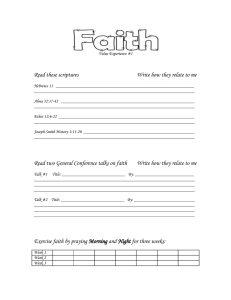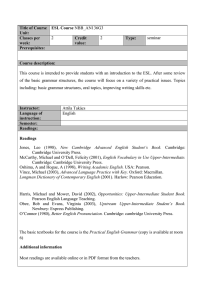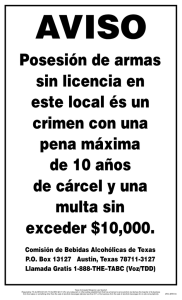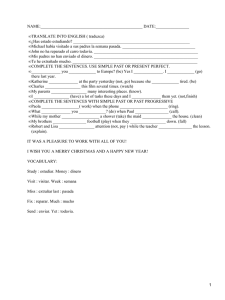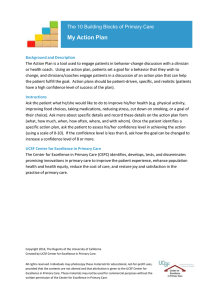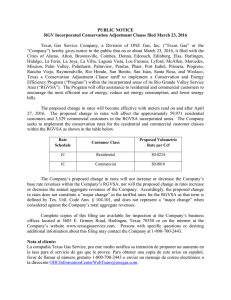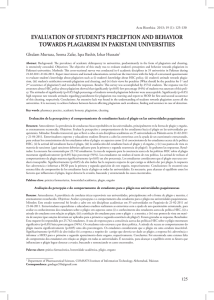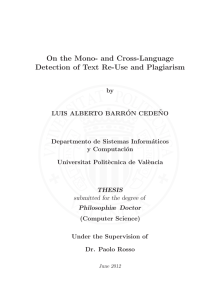FLL 511 – Fall 2016 Bibliography and Methods of Research
Anuncio
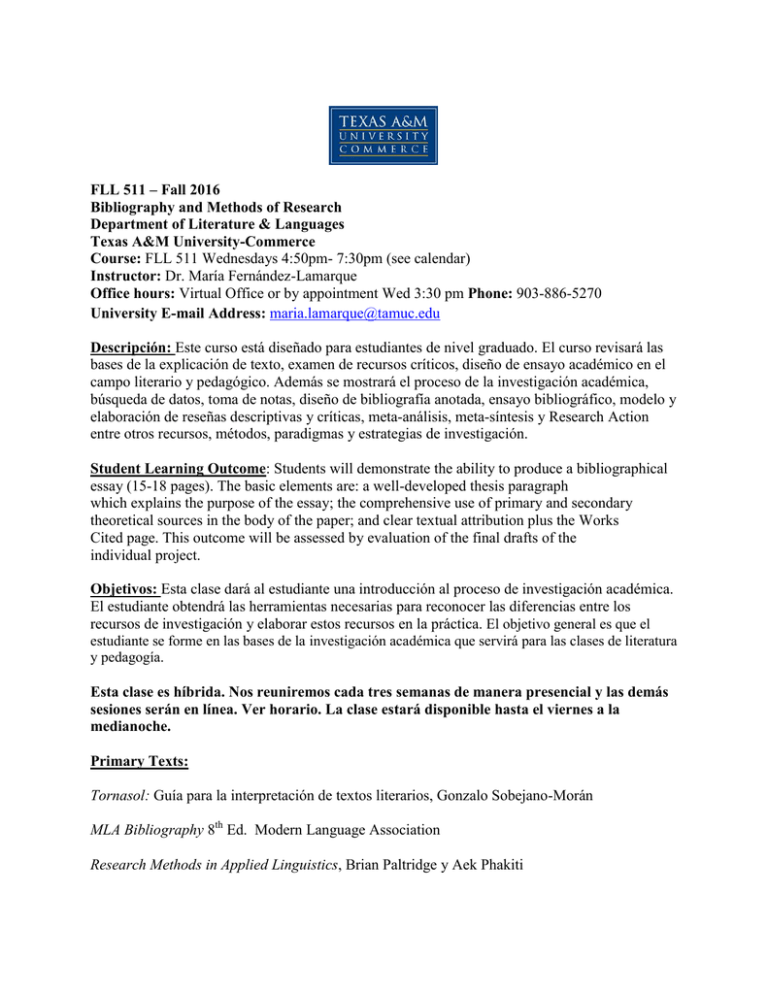
FLL 511 – Fall 2016 Bibliography and Methods of Research Department of Literature & Languages Texas A&M University-Commerce Course: FLL 511 Wednesdays 4:50pm- 7:30pm (see calendar) Instructor: Dr. María Fernández-Lamarque Office hours: Virtual Office or by appointment Wed 3:30 pm Phone: 903-886-5270 University E-mail Address: maria.lamarque@tamuc.edu Descripción: Este curso está diseñado para estudiantes de nivel graduado. El curso revisará las bases de la explicación de texto, examen de recursos críticos, diseño de ensayo académico en el campo literario y pedagógico. Además se mostrará el proceso de la investigación académica, búsqueda de datos, toma de notas, diseño de bibliografía anotada, ensayo bibliográfico, modelo y elaboración de reseñas descriptivas y críticas, meta-análisis, meta-síntesis y Research Action entre otros recursos, métodos, paradigmas y estrategias de investigación. Student Learning Outcome: Students will demonstrate the ability to produce a bibliographical essay (15-18 pages). The basic elements are: a well-developed thesis paragraph which explains the purpose of the essay; the comprehensive use of primary and secondary theoretical sources in the body of the paper; and clear textual attribution plus the Works Cited page. This outcome will be assessed by evaluation of the final drafts of the individual project. Objetivos: Esta clase dará al estudiante una introducción al proceso de investigación académica. El estudiante obtendrá las herramientas necesarias para reconocer las diferencias entre los recursos de investigación y elaborar estos recursos en la práctica. El objetivo general es que el estudiante se forme en las bases de la investigación académica que servirá para las clases de literatura y pedagogía. Esta clase es híbrida. Nos reuniremos cada tres semanas de manera presencial y las demás sesiones serán en línea. Ver horario. La clase estará disponible hasta el viernes a la medianoche. Primary Texts: Tornasol: Guía para la interpretación de textos literarios, Gonzalo Sobejano-Morán MLA Bibliography 8th Ed. Modern Language Association Research Methods in Applied Linguistics, Brian Paltridge y Aek Phakiti Publication Manual of the American Psychological Association, 6th Ed. American Psychological Association. Textos fílmicos Stranger than Fiction. Dir. Marc Forster, 2006. The Wave. Dir. Dennis Wansel, 2008. Dead Poets Society. Dir. Peter Weir, 1989. Textos de crítica y teoría Fernández-Lamarque, Maria. Textual Transformations in Children’s Literature. Edited by Benjamin Lefebvre. Book reviewed for (IRCL) International Research in Children's Literature 6.2 (2013): 227-29. -----. “Caín, la última obra de José Saramago” to be published in Revista Cronopios, (Colombia) in March 2014 with permission of Hispania, the American Association of Teachers of Spanish and Portuguese and John Hopkins UP.49 (March) www.revistacronopio.com -----. Colorín Colorado: Introducción a la literatura infantil y juvenil Hispanoamericana by Ann González Hispania 99. 1 (2016) -----. "La Bella Durmiente a través de la historia by Carolina Fernández Rodríguez (2014)." Hispania 97.3 (2014): 511-513. -----.“Nada de Carmen Laforet y ‘Caperucita roja” Destiempos 48. 9 (2015): 40-51. Published online December 1, 2015. http://www.revistadestiempos.com Warford, M. ¿Enseñar gramática y cultura en la lengua extranjera? Hispania 93 (2010) 292-304 Zyzik, E. “Sin pelos en la lengua: La adquisicion de modismos en una clase de español como lengua extranjera” - Hispania 93 (2010 ) 493-470. Spivak, Gayatri. “How to Read a Culturally ‘Different’Book? “ Colonial Discourse/Poscolonial Theory. Manchester: Manchester UP, 1994. Lloyd, David. “Ethnic Culture and Minorities” How to Read a Culturally ‘Different’Book? “ Colonial Discourse/Poscolonial Theory. Manchester: Manchester UP, 1994. Evaluación Explication de texte (1) 10% Análisis de artículos académicos (2) 20% Reseñas (2): 20 % Bibliografía anotada: 10% Ensayo bibliográfico (ensayo final): 30% Participación y preparación para la clase: 10% Explication de texte: Habrá uno durante el semestre. Los estudiantes desarrollarán una idea tomando como fuente los textos asignados (Por ejm. el rol de la escritura, la naturaleza, la historia/Historia, etc...). El trabajo tendrá una tesis (idea central) que será desarrollada en el cuerpo del ensayo y una conclusión. El comentario deberá de ser escrito organizadamente. La longitud será de 5 pág. a doble espacio y obras citadas en la página 6. Times New Roman, 12p. Ver ejemplo en e-college. Análisis de artículos académicos: Dos durante el semestre. Se examinará el formato estético del artículo y las diferentes aproximaciones o métodos en el campo literario y lingüístico (metaanálisis, metasíntesis) Reseñas: Habrá dos durante el semestre. Una será descriptiva y la otra crítica. Bibliografía anotada: Una durante el semestre. Constará de por lo menos 15 fuentes. Times New Roman. 12p. Formato MLA 7ma ed. Doble espacio. Ensayo final: Será un ensayo bibliográfico. El número de fuentes consultadas serán como mínimo 20. El ensayo deberá estar libre de errores ortográficos y/o gramaticales. La longitud de cada ensayo es de 20 pág. como mínimo. Deberá ser escrito a espacio doble, Times New Roman, 12p. Formato MLA, 7ma ed. Participación y preparación para la clase: La participación es crucial en una clase. El estudiante será evaluado por su nivel de preparación para la clase y su actitud responsable, ética e interesada en el curso. Nota: Este programa de clases está sujeto a cambios debido a imponderables que se presenten durante el semestre. University Policy . Statements to students required by the University and the Department of Literatures and Languages Behavior: All students enrolled at the University shall follow the tenets of common decency and acceptable behavior conducive to a positive learning environment. Americans with Disabilities Act Statement: Students requesting accommodations for disabilities must go through the Academic Support Committee. For more information, please contact the Director of Disability Resources & Services, Halladay Student Services Building, Room 303D, (903) 886-5835. Plagiarism: Plagiarism is borrowing the work of others and not giving credit where credit is due. It is unethical and reflects very poorly on a person’s character. In short, resist the temptation. And please read carefully the handout on plagiarism to learn how to avoid accidentally committing plagiarism. Instructors in the Department of Literature and Languages do not tolerate plagiarism and other forms of academic dishonesty. Instructors uphold and support the highest academic standards, and students are expected to do likewise. Penalties for students guilty of academic dishonesty include disciplinary probation, suspension, and expulsion. (Texas A&M University-Commerce Code of Student Conduct 5.b[1,2,3]) General University Policies 1. Late work This is an intense course with no extended deadlines. No late work will be accepted in this course, without exceptions. Work should be submitted by midnight (CT) on the due date provided in the class schedule. Failure to submit an assignment on time will result in a zero (F) grade. In the case of an emergency or other reasonable situation which may affect your submissions, please contact me immediately. 2. Academic Dishonesty Plagiarism is borrowing (stealing) the work of others and not giving credit where credit is due. It is unethical and reflects very poorly on a person’s character. Copying someone else's work, or asking a friend or tutor to write your work constitutes a violation of the TAMUC Academic Honesty Policy. Likewise, the use of electronic media to translate your work to Spanish is also unacceptable. STATEMENT OF PLAGIARISM AND ACADEMIC CHEATING Plagiarism and Academic Cheating Plagiarism and academic cheating will not be tolerated in the Department of Literature and Languages. Plagiarism is the unacknowledged use of work that is not original or work in which unauthorized assistance has 1 been given by another person. Academic cheating is any dishonest practice by students in meeting the academic requirement of courses. The Literature and Languages faculty want to heighten your awareness of the more common forms of plagiarism. The following categories of plagiarism, often committed unintentionally by students, represent selected forms of unacknowledged borrowing. a. Padded Bibliographies. A bibliography is padded if it includes entries which are not cited in the paper and which are not otherwise identified as “Works Consulted.” 1 Discovery of popular historian Stephen Ambrose’s plagiarism sparked numerous essays which suggest that plagiarism is still not acceptable. See, for example, Richard A. Posner, “On Plagiarism,” Atlantic Monthly, April 2002, 23; and Roger Rosenblatt, “When the Hero Takes a Fall,” Time, 21 January 2002, 130. b. Improper Use of Indirect Sources. If you want to quote information that someone else has quoted, you must show that you found the material cited in a source other than the original. c. Inaccurate Paraphrasing. Paraphrasing is expressing someone else’s ideas in other words. Some of the key words of the original may appear in the paraphrase; but if exact phrases or sentences are used from the original, then paraphrasing has stopped and quoting has begun. d. Improperly Documented Précis and Synopsis. A précis is a concise summary of main points; a synopsis is a condensed statement or outline of the considered material. Both are shorter than a paraphrase. Both use the student’s own words. Like paraphrasing, both require documentation. e. Omitted Quotation Marks. Verbatim materials (that is, paragraphs, sentences, phrases, key words) require proper notation in addition to identification of the source. Accurate methods of documentation and quoting indicate more than writing skill; they indicate the honesty and fidelity with which students have treated primary and secondary sources. Texas A&M University-Commerce describes the possible consequences of plagiarism in university policy and in the guidebook for students. Confirmed cases of plagiarism or of academic cheating discovered by instructors will be reported to the head of this department and for referral to the disciplinary committee and/or to the Dean of Student Life will be at the discretion of the instructor. Plagiarism is a serious offense, as serious as cheating on an examination. If you have any doubts about what constitutes plagiarism, you should consult your instructor, who is willing to answer questions about proper acknowledgment of borrowed material and documentation. Penalties for students guilty of academic dishonesty include disciplinary probation, suspension, and expulsion. (Texas A&M University-Commerce Code of Student Conduct 5.b[1,2,3]) Undergraduate students at Texas A&M University-Commerce are expected to maintain high standards of integrity and honesty in all of their scholastic work. Faculty and staff are expected to uphold and support student integrity and honesty by maintaining conditions that encourage and enforce academic honesty. Conduct that violates generally accepted standards of academic honesty is defined as academic dishonesty (see definitions). In addition, F-1 and J-1 international students must comply with the Student Exchange Visitor Program regulation related to their visa status. Penalties for students guilty of academic dishonesty include disciplinary probation, suspension, and expulsion (Texas A&M UniversityCommerce Regulation 13.99.99.R0.03 ‘Undergraduate Academic Dishonesty’). For further information please see the Academic Honesty statement of the Department of Literature and Languages below. 3. Students with Disabilities The Americans with Disabilities Act (ADA) is a federal antidiscrimination statute that provides comprehensive civil rights protection for persons with disabilities. Among other things, this legislation requires that all students with disabilities be guaranteed a learning environment that provides for reasonable accommodation of their disabilities. If you have a disability requiring an accommodation, please contact: Office of Student Disability Resources and Services Texas A&M University-Commerce Gee Library, Room 132 Phone (903) 886-5150 / (903) 886-5835 StudentDisabilityServices@tamuc.edu www.tamuc.edu/CampusLife/CampusServices/studentDisabilityResourcesAndServices/default.a spx 1. Student Conduct and Discriminatory Behavior All students enrolled at the University shall follow the tenets of common decency and acceptable behavior conducive to a positive learning environment. (See Code of Student Conduct from Student Guide Handbook). Students also should consult the Rules of etiquette for more information regarding how to interact with students in an online environment: http://www.albion.com/netiquette/corerules.html A&M-Commerce will comply in the classroom, in the campus, and in online courses, with all federal and state laws prohibiting discrimination and related retaliation on the basis of race, color, religion, sex, national origin, disability, age, genetic information or veteran status. Further, an environment free from discrimination on the basis of sexual orientation, gender identity, or gender expression will be maintained. 6. Withdraws & Incomplete grade A student may drop a course by logging into his/her myLEO account and clicking on the hyperlink labeled “Drop a class” from among the choices found under the myLeo section of the Web page. I reserve the right to drop a student from the course administratively for excessive absences or violations of the Code of Student Conduct. Incomplete grades (grade of “X”) are granted only under rare and extraordinary circumstances which are fully documented. 7. Grievance procedures Students who have concerns regarding their courses should first address those concerns with the assigned instructor in order to reach a resolution. Students who are unsatisfied with the outcome of that conversation or have not been able to meet individually with their instructor, whether in-person, by email, by telephone, or by another communication medium, should then schedule an appointment with the Director of the Spanish Program, Dr. Flavia Belpoliti (flavia.belpoliti@tamuc.edu). If there are still unresolved issues, students need to schedule an appointment with the Department Head, Dr. Hunter Hayes, or Assistant Department Head, Dr. Susan Stewart, by completing a Student Grievance Form (available in the Main Office, HL 141). In the event that the instructor is the Department Head, the student should schedule a meeting with the Dean of the College of Arts, Sciences, and Humanities after following the steps outlined above; if the instructor is the Assistant Department Head, students should schedule a meeting with the Department Head. Where applicable, students should also consult University Procedure 13.99.99.R0.05 (“Student Appeal of Instructor Evaluation”). 8. Tutoring and Advising Your Instructor: I am your first resource and want to make your experience as positive as possible. Please talk to me if you are having any problems in the course and I will do my best to assist you. Tutors: Spanish tutoring is available in HL 119. This service is free of charge and is offered daily. Sign up is on the door. Please note that there is a maximum time limit you can sign up for per day, 20 minutes. The Trio Program is also a TAMUC source for tutoring. Advising: Dr. Flavia Belpoliti is the Spanish Programs adviser. To declare a major, second major, or minor in Spanish, or to get further information on the Spanish program, please make an appointment with Dr. Belpoliti (flavia.belpoliti@tamuc.edu). 9. Technology Requirements for Web-Enhanced / Online courses To fully take advantage of the LearningStudio platform tools, you will need regular access to a computer with a broadband Internet connection. The minimum computer requirements are: 512 MB of RAM, 1 GB or more preferred Broadband connection required courses are heavily video intensive Video display capable of high-color 16-bit display 1024 x 768 or higher resolution Sound card, which is usually integrated into your desktop or laptop computer Speakers or headphones. Microphone Internet connection is necessary to participate in discussions and assignments, access readings, transfer course work, and receive feedback from your professor. Current, Flash enabled browser. For PC users, the suggested browser is Internet Explorer 9.0 or 10. For Mac users, the most current update of Firefox is suggested. For courses where interactive tools are used, like VoiceThread or ClassLive Pro, headphones are suggested for use with recording and playback. We recommend a webcam with an integrated microphone, such as the Microsoft LifeCam Cinema. All devices should be installed and configured before class begins. Both versions of Java (32 bit and 64 bit) must be installed and up to date on your machine. Java can be downloaded at: http://www.java.com/en/download/manual.jsp. Current anti-virus software must be installed and kept up to date. You will need some additional free software for enhanced web browsing. Ensure that you download the free versions of the following software: Adobe Reader & Adobe Flash Player At a minimum, you must have Microsoft Office 2013, 2010, 2007 or Open Office. Microsoft Office is the standard office productivity software utilized by faculty, students, and staff. Microsoft Word is the standard word processing software, Microsoft Excel is the standard spreadsheet software, and Microsoft PowerPoint is the standard presentation software. Copying and pasting, along with attaching/uploading documents for assignment submission, will also be required. If you do not have Microsoft Office, you can check with the bookstore to see if they have any student copies. For additional information: https://secure.ecollege.com/tamuc/index.learn?action=technical Pearson LearningStudio (e-College) Access and Navigation 1) Pearson LearningStudio (eCol 2) lege) Information This course will be facilitated using Pearson LearningStudio, the learning management system used by Texas A&M University-Commerce. To get started with the course, go to: http://www.tamuc.edu/myleo.aspx. You will need your CWID and password to log in to the course. If you do not know your CWID or have forgotten your password, contact Technology Services at 903.468.6000 or helpdesk@tamuc.edu. It is strongly recommended that you perform a “Browser Test” prior to the start of your course. To launch a browser test, login to Pearson LearningStudio, click on the ‘myCourses’ tab, and then select the “Browser Test” link under Support Services. 3) Pearson LearningStudio Student Technical Support Texas A&M University-Commerce provides students technical support in the use of Pearson LearningStudio. Technical assistance is available 24 hours a day/ 7 days a week. If at any time you experience technical problems (e.g., you can't log in to the course, you can't see certain material, etc.) please contact the Pearson Learning Studio Help Desk, available 24 hours a day, seven days a week: Chat Support: Click on 'Live Support' on the tool bar within your course to chat with a Pearson LearningStudio Representative. Phone: 1-866-656-5511 (Toll Free) to speak with Pearson LearningStudio Technical Support Representative. Email: helpdesk@online.tamuc.org to initiate a support request with Pearson LearningStudio Technical Support Representative. 4) Accessing Help from within Your Course: Click on the 'Tech Support' icon on the upper left side of the screen inside the course. You will then be able to get assistance via online chat, email or by phone by calling the Help Desk number noted below. Note: Personal computer problems do not excuse the requirement to complete all course work in a timely and satisfactory manner. Each student needs to have a backup method to deal with these inevitable problems. These methods might include the availability of a backup PC at home or work, the temporary use of a computer at a friend's home, the local library, office service companies, an Internet cafe, or a bookstore, such as Barnes & Noble, etc. Approved statement for inclusion in university publications (i.e. Syllabi, Faculty Handbook, Undergraduate and Graduate Catalog, Student Guidebook …) 10. Campus Concealed Carry Texas Senate Bill - 11 (Government Code 411.2031, et al.) authorizes the carrying of a concealed handgun in Texas A&M University-Commerce buildings only by persons who have been issued and are in possession of a Texas License to Carry a Handgun. Qualified law enforcement officers or those who are otherwise authorized to carry a concealed handgun in the State of Texas are also permitted to do so. Pursuant to Penal Code (PC) 46.035 and A&M-Commerce Rule 34.06.02.R1, license holders may not carry a concealed handgun in restricted locations. For a list of locations, please refer to ((http://www.tamuc.edu/aboutUs/policiesProceduresStandardsStatements/rulesProcedures/34SafetyO fEmployeesAndStudents/34.06.02.R1.pdf) and/or consult your event organizer). Pursuant to PC 46.035, the open carrying of handguns is prohibited on all A&M-Commerce campuses. Report violations to the University Police Department at 903-886-5868 or 9-1-1. Academic Dishonesty Appendix Department of Literature and Languages Texas A&M University-Commerce Policy #12 April 28, 2003 ACADEMIC HONESTY Preamble. Students at Texas A&M University-Commerce are expected to maintain high standards of integrity and honesty in all their scholastic work. Faculty members are expected to employ teaching practices that encourage academic honesty. 1. Academic Dishonesty Defined. Texas A&M University-Commerce defines “academic dishonesty” in the following way (Procedure A13.12 “Academic Honesty”): Academic dishonesty includes, but is not limited to, plagiarism (the appropriation or stealing of the ideas or words of another and passing them off as one's own), cheating on exams or other course assignments, collusion (the unauthorized collaboration with others in preparing course assignments), and abuse (destruction, defacing, or removal) of resource material. 2. “Plagiarism” Further Specified. The Department of Literature and Languages builds on the university definition of “plagiarism,” given in 1, in the following manner (taken from “Defining and Avoiding Plagiarism: The Council of Writing Program Administrators’ Statement on Best Practices” undated, pages 1-2, 12,2003. http://www.ilstu.edu/~ddhesse/wpa/positions/WPAplagiarism.pdf) Plagiarism occurs when a writer deliberately uses someone else’s language, ideas, or other original (not common-knowledge) material without acknowledging its source. [. . .] Ethical writers make every effort to acknowledge sources fully and appropriately in accordance with the contexts and genres of their writing. A student who attempts (even if clumsily) to identify and credit his or her source, but who misuses a specific citation format or incorrectly uses quotation marks or other forms of identifying material taken from other sources, has not plagiarized. Instead, such a student should be considered to have failed to cite and document sources appropriately. 3. “Collusion” Further Specified. Collusion specifically includes selling academic products. According to the Texas Penal Code (Title 7 Offenses Against Property, Chapter 32 Fraud, § 32.50 Deceptive Preparation and Marketing of Academic Product), an “‘academic product’ means a term paper, thesis, dissertation, essay, report, recording, work of art, or other written, recorded, pictorial, or artistic product or material submitted or intended to be submitted by a person to satisfy an academic requirement of the person.” The Texas Penal Code also specifies that person commits a Class C misdemeanor offense “if, with intent to make a profit, the person prepares, sells, offers or advertises for sale, or delivers to another person an academic product when the person knows, or should reasonably have known, that a person intends to submit or use the academic product to satisfy an academic requirement of a person other than the person who prepared the product.” 4. Responsibility. Matters of academic dishonesty are handled initially by the instructor. If the instructor feels the problem warrants more attention, it should then be pursued through the department head. If the department head and instructor wish, it should be brought to the attention of the Dean of the college for study and review before being referred to the University Discipline Committee (adapted from Texas A&M University-Commerce Procedure A13.04, “Plagiarism”). Instructors may also choose to refer cases directly to the University Discipline Committee (Texas A&M University-Commerce Code of Student Conduct 6.a [2]). 5. Statement for Course Outlines. Instructors of record in the Department of Literature and Languages are required to include an Academic Honesty statement in all course outlines. The following language is suggested for that statement: Instructors in the Department of Literature and Languages do not tolerate plagiarism and other forms of academic dishonesty. Instructors uphold and support the highest academic standards, and students are expected to do likewise. Penalties for students guilty of academic dishonesty include disciplinary probation, suspension, and expulsion. (Texas A&M University-Commerce Code of Student Conduct 5.b [1,2,3]) 6. This Policy supersedes Department of Literature and Languages Policy #12, “Plagiarism,” dated October 10, 1990, and will be effective until further notice. 7. The Head of the Department of Literature and Languages is responsible for maintaining and reinforcing this and other policies. Dr. Hunter Hayes, Head, Department of Literature and Languages April 28, 2003 The Spanish Program at TAMUC presents the following events for Fall 2016, and invites you to actively participate. 4 extra-points for your final grade will be granted after attending the event/s and completing the assigned activities. 1) Maestro Soler Guitar Concert. Friday October 7th, 10:30 am at the BA Auditorium. (2 pts.) 2) “Cervantes in Film”. Tuesday October 4th and Thursday October 13th, 4:30pm, Hall of Languages 203. (1 pt. each) 3) “Día de los Muertos” Altar Exhibition. The Spanish Program invites all students to participate building an altar to commemorate Cervantes’ 400 anniversary. TBA (1 pt.) Calendario de Actividades *RMAL corrresponde al libro de texto Research Methods in Applied Linguistics Semana 1 (Agosto 31) ONLINE Bienvenida a la clase. ¿Cómo buscar información en la red? Fuentes bibliográficas, tipos, selección. La base de la investigación académica. Revisión bases del análisis literario. Libro Tornasol. (La Narrativa, Pg. 1-33) Semana II (Septiembre 7) Presencial . Invitada: Sarah Northam . ¿Qué es investigación académica? *RMAL Cap 1. Approaches and Methods in Applied Linguistics Research y Taller. Libro Tornasol (Pg. 3563) Semana III: (Septiembre 14) ONLINE. Revisión bases del análisis literario Tornasol El Lenguaje Literario (Pg. 234-245) y RMAL (pag. 551-749. Cap. 1 Research Paradigm. Discusión online. Semana IV (Septiembre 21) ONLINE. Revisión bases del análisis literario. Libro Tornasol (El cine. AnálisisPg. 164-177)RMAL Cap. 2 Quantitative Research and Analysis. Discusión online. Semana V (Septiembre 28) ONLINE. Film: Stranger than Fiction. Discusión online. RMAL Cap. 3 Qualitative Research and Analysis. Semana VI (Octubre 05) Presencial. Explicación de texto. Entrega. Discusión. RMAL Cap. 7 Case Studies y Cap. 8 Ethnographic Studies Semana VII (Octubre 12) ONLINE. Artículos académicos/Pedagogía/Literatura/Estudios culturales/Teoría y RMAL Cap. 9 Critical Research in Applied Linguistics. Semana VIII (Octubre 19) ONLINE. Artículos académicos Artículos académicos/Pedagogía/Literatura/Estudios culturales/Teoría . RMAL Cap. 10 Narrative Inquiry Semana IX (Octubre 26) ONLINE: Entrega análisis artículos académicos. Film: The Wave Semana X (Noviembre 02) Presencial: La reseña / tipos/Taller. RMAL Cap. 11 Action Research Semana XI: (Noviembre 09) ONLINE: Entrega de reseña pedagogía/literatura. RMAL Cap. 12 Discourse Analysis. Semana XII (Noviembre 16) Presencial: Ensayo bibliográfico/Bibliografía anotada. RMAL Cap. 13 Research Synthesis. Semana XIII (Noviembre 23): Thanksgiving Semana XIV (Noviembre 30) Presencial : Ensayo bibliográfico/Bibliografía anotada. Entrega de trabajo bibliografía anotada. Semana XV (Diciembre 07) ONLINE. Film: Dead Poets Society Semana XVI (Diciembre 14) Entrega de trabajo final por e-college. Fin de curso.
